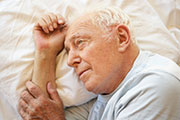- Could Artificial Sweeteners Be Aging the Brain Faster?
- Techniques for Soothing Your Nervous System
- Does the Water in Your House Smell Funny? Here’s Why
- Can a Daily Dose of Apple Cider Vinegar Actually Aid Weight Loss?
- 6 Health Beverages That Can Actually Spike Your Blood Sugar
- Treatment Options for Social Anxiety Disorder
- Understanding the Connection Between Anxiety and Depression
- How Daily Prunes Can Influence Cholesterol and Inflammation
- When to Take B12 for Better Absorption and Energy
- Epsom Salts: Health Benefits and Uses
Night Owls Run Higher Risk of Health Problems, Study Finds


Night owls are more likely than early risers to develop diabetes and other health problems, even if they get the same amount of sleep.
That’s the conclusion of a new study that included more than 1,600 people in South Korea, aged 47 to 59, who provided information about their sleep habits and underwent tests to assess their health.
“Regardless of lifestyle, people who stayed up late faced a higher risk of developing health problems like diabetes or reduced muscle mass than those who were early risers,” Dr. Nan Hee Kim, of Korea University College of Medicine in Ansan, South Korea, said in a news release from the Endocrine Society.
“This could be caused by night owls’ tendency to have poorer sleep quality and to engage in unhealthy behaviors like smoking, late-night eating and a sedentary lifestyle,” Kim added.
Of the 1,600 people in the study, 95 were night owls, 480 were early risers and the remainder fell somewhere in the middle.
Even though they tended to be younger, night owls had higher levels of body fat and fats in the blood than early risers. Night owls were also more likely to have sarcopenia, a condition where the body gradually loses muscle mass, the findings showed.
Men who were night owls were more likely to have diabetes or sarcopenia than those who were early risers, the investigators found. Compared to women who were early risers, women who were night owls tended to have more belly fat and a higher risk of metabolic syndrome — a collection of health conditions that increase the risk of diabetes, heart disease and stroke.
The study was published online April 1 in the Journal of Clinical Endocrinology & Metabolism.
Considering that many younger people are night owls, the risk associated with this type of sleep habit is “an important health issue that needs to be addressed,” Kim said.
The study found an association between being a night owl and increased health risks; it did not prove cause-and-effect.
More information
The U.S. National Institute of Neurological Disorders and Stroke has more about sleep.
Source: HealthDay
Copyright © 2026 HealthDay. All rights reserved.










